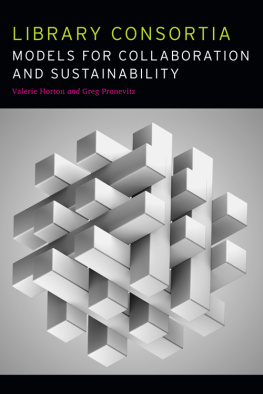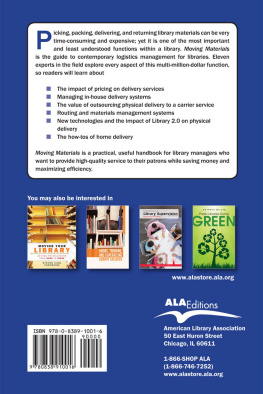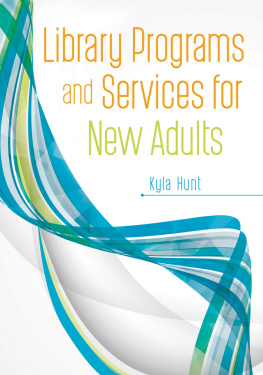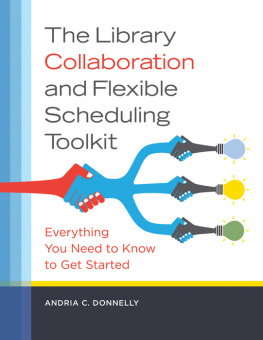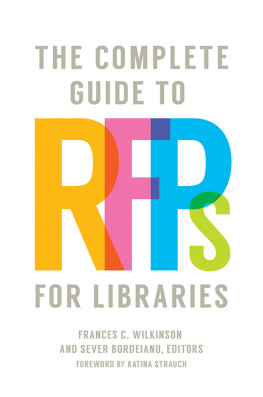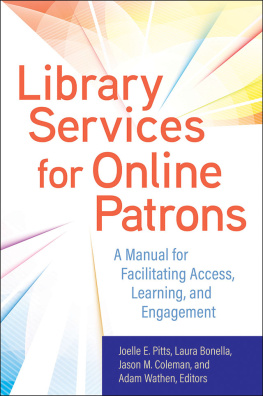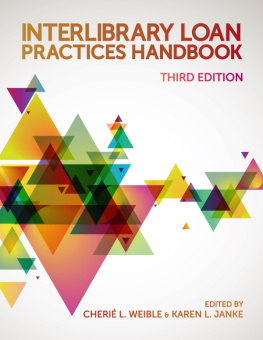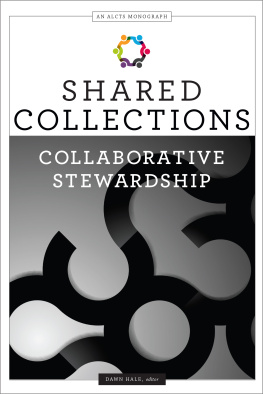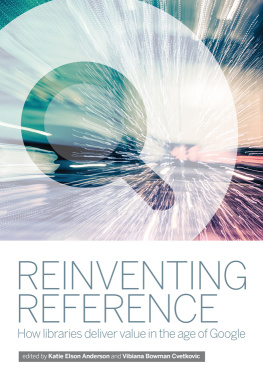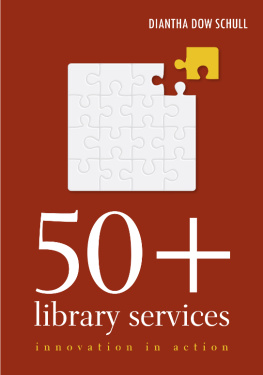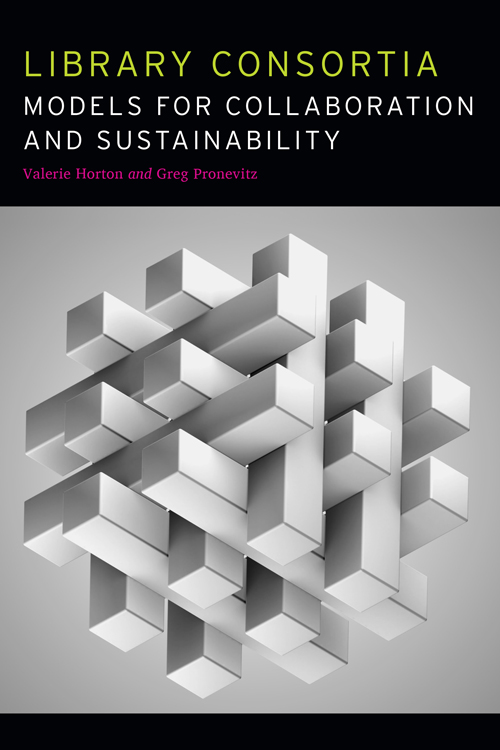
ALA Editions purchases fund advocacy, awareness, and accreditation programs for library professionals worldwide.
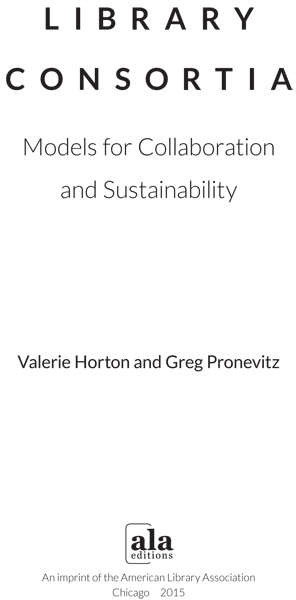
2015 by Valerie Horton and the Massachusetts Library System.
Extensive effort has gone into ensuring the reliability of the information in this book; however, the publisher makes no warranty, express or implied, with respect to the material contained herein.
ISBNs
978-0-8389-1218-8 (paper)
978-0-8389-1248-5 (PDF)
978-0-8389-1249-2 (ePub)
978-0-8389-1250-8 (Kindle)
Library of Congress Cataloging-in-Publication Data
Library consortia : models for collaboration and sustainability / [edited by] Valerie Horton and Greg Pronevitz.
pages cm
Includes bibliographical references and .
ISBN 978-0-8389-1218-8 (softcover : alk. paper)ISBN 978-0-8389-1249-2 (epub)ISBN 978-0-8389-1248-5 (pdf)ISBN 978-0-8389-1250-8 (kindle) 1. Library cooperationUnited States 2. Library cooperationUnited StatesCase studies. I. Horton, Valerie. II. Pronevitz, Greg.
Z672.13.U6L53 2015
021.6'4dc23 2014016667
Cover design by Kimberly Thornton. Image Tomislav Forgo / Shutterstock, Inc.
Contents
Valerie Horton
Greg Pronevitz
Valerie Horton
Valerie Horton
Tracey Leger-Hornby and Greg Pronevitz
Lori Bowen Ayre and Greg Pronevitz
Introduction
Jennifer Hootman, Matt Lee, and Mary Parker
Linda Crowe and Heather Teysko
Deborah Hoadley
Mark Sullivan
Ann Okerson
Cyril Oberlander
Kathleen Drozd
Randy Dykhuis
Vicki Teal Lovely
Jeanine F. Gatzke and Belinda E. Lawrence
Liz Bishoff
Jay Schafer
Anne R. Kenney and James Neal
Lisa Priebe
Kelly Jo Woodside
Valerie Horton
W e owe much gratitude to the colleagues who assisted us and contributed to this work, and acknowledge them here in the order in which their contributions appear in this book. A brief biographical sketch for each author is found after the conclusion.
We began research for this book by surveying our consortial colleagues. We thank the 77 who did respond. We focused on the 66 US respondents. We also had 11 international consortial responses. Jeanette Smithee, Southeast Florida Information Network (SEFLIN), was kind enough to work with us to expand on her responses to create a case study of SEFLINs experiences after the 2008 recession, which can be found in .
Discovery to delivery is such an integral part of consortial services in most organizations that we included chapters devoted to both discovery and delivery. Tracey Leger-Hornby, formerly of Worcester Polytechnic Institute, and Lori Ayre, of the Galecia Group, brought the experience and talent to make possible.
As we examined the consortial landscape and found sustainability to be a key issue, we felt that those directly involved in this important issue would be best equipped to write about the service projects that contributed to sustainability and member library success. We called on colleagues to prepare case studies of innovative projects to share with our readers and we are grateful for their efforts. These contributions are outlined in the overview of the case studies.
Greg Pronevitz and Valerie Horton
Valerie Horton
The idea that libraries should, in some way, find means of work cooperatively... is a deeply rooted concept in librarianship.
J . W . K RAUS
N o library stands alone. Library cooperation goes back to the 1880s and is a long-standing tenet of the profession. Collaboration is strongly rooted in most of our current activities. Even Harvard University has stated that no library is big enough or rich enough to go it alone anymore. In these days of scarce public resources, there is a strong belief that libraries need to justify every tax dollar received and that collaboration helps libraries extend the value of every dollar spent.
The Council on Library and Information Resources has detailed many recent collaborative efforts in its report Higher Ground: Building a Strategic Digital Environment for Higher Education. The report states that the next two decades could witness an extraordinary fluorescence of activity among universities and colleges focused on repositioning, consolidation, and convergence. Collaboration is not just flourishing in academia, but also in public libraries as demonstrated by the number of libraries joining cooperatively managed e-book systems. Further, a new journal, Collaborative Librarianship, had over 250,000 articles downloaded in its first five years. The tool that libraries most often use to launch and manage collaborative projects is the library consortium.
This book covers the history, current landscape, management, critical trends, and key services that define todays library consortium. The book was written to help new library staff understand the full range of activities that take place in a modern consortia and to help consortia managers, participants in consortial governance, and participating libraries look for ways to revise current practices, expand services, or adopt new project ideas.
look at a key trend, the discovery-to-delivery continuum that allows us to maximize our patron services. Consortias vital role in discovery to delivery is highlighted in these chapters. Finally, the 16 case studies selected for this book explore both the core services of consortia, such as support for integrated library systems and training, and new services, such as e-book technology and delivery methods.
In the spirit of library cooperation, we seek to share our 70 years of experience in libraries, including over 35 years managing five different library consortia in four states. We believe our experiences together with these important case studies will help the reader understand the dynamic and even revolutionary activities of todays library consortium.
What Is a Library Consortium?
The word consortium is a good word for libraries... as it combines the past with the present and the future.
J AMES K OPP
Groups of collaborating libraries are called cooperatives, networks, collectives, alliances, and partnerships as well as consortia. The term consortium has been common in library literature for about 50 years. Clearly defining a library consortium can be a challenge given the diverse missions, roles, and memberships of these organizations. According to the U.S. Code of Federal Regulations, Sect. 54.500, a library consortium is any local, regional, or national cooperative association of libraries that provides for the systematic and effective coordination of the resources of school, public, academic, and special libraries and information centers, for improving services to the clientele of such libraries. Dictionary definitions tend to focus on the association aspect of consortium, and on the goal of achieving some result beyond the resources of any single member.
Library consortia are as varied as the libraries they serve. Some consortia are international (OCLC), national (LYRASIS), regional (AMIGOS Library Services), or statewide (OhioLINK, Ohios academic network). Others serve smaller geographic regions or a single metropolitan area, such as Metropolitan Library Service Agency (MELSA). Library consortia range in size from hugein 2012 OCLC had 22,599 membersto the very small, such as the Flatirons Library Consortia, which has three members. Consortia can be geared towards one type of library or serve multiple types of libraries. Consortia also vary from informal groups to government-sponsored organizations to nonprofit incorporated entities. Library consortia taxonomies can be based on governance structure, geographic service area, or the type of libraries served. This book looks at all types of library consortia and gives examples from many different types and sizes of organizations.
Next page
